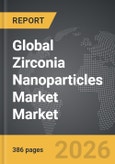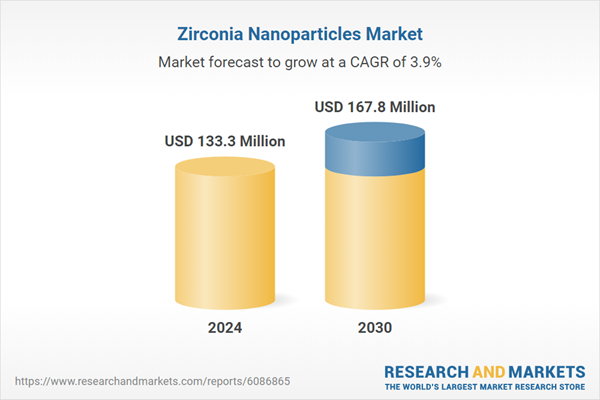Global Zirconia Nanoparticles Market - Key Trends & Drivers Summarized
Why Are Zirconia Nanoparticles Gaining Prominence Across Advanced Material Applications?
Zirconia nanoparticles are emerging as a key enabler in high-performance materials science due to their exceptional thermal stability, mechanical strength, corrosion resistance, and unique optical and electrical properties. As industries increasingly seek nanomaterials that can enhance product durability, functionality, and miniaturization, zirconia (ZrO2) nanoparticles are being adopted in a growing range of sectors including electronics, automotive, aerospace, biomedical, and energy. Their high fracture toughness and wear resistance make them indispensable in structural ceramics, dental implants, and cutting tools. In optics and photonics, their low thermal conductivity and high refractive index enable the development of advanced coatings and sensors. The rise in demand for solid oxide fuel cells (SOFCs), where zirconia serves as a critical electrolyte material, is further bolstering the market. Additionally, the material's biocompatibility and non-toxicity are driving its use in biomedical implants, drug delivery systems, and biosensors. As industries look to develop lighter, stronger, and more energy-efficient solutions, zirconia nanoparticles offer a powerful combination of material advantages that position them at the forefront of next-generation engineering and nanotechnology initiatives.How Are Innovations in Synthesis and Surface Engineering Enhancing Particle Performance?
Technological breakthroughs in nanoparticle synthesis and surface functionalization are significantly improving the performance and application range of zirconia nanoparticles. Advanced methods such as sol-gel processing, hydrothermal synthesis, and flame spray pyrolysis now allow for the precise control of particle size, crystallinity, and morphology, resulting in highly uniform and stable nanoparticles. Doping with yttria (Y2O3) or ceria (CeO2) enhances ionic conductivity and thermal stability, making the material suitable for demanding environments like high-temperature electrochemical devices. Surface modification techniques are enabling the creation of core-shell structures and tailored surface chemistries, improving dispersibility in polymers, solvents, and biological media. This has expanded the use of zirconia nanoparticles in composite materials, catalysis, and nanomedicine. Moreover, functionalized particles are increasingly being integrated into smart coatings that offer anti-fouling, UV protection, and self-healing properties. Innovations in scalable production technologies are also making it feasible to manufacture high-purity zirconia nanoparticles at commercial volumes without compromising performance, thereby meeting the growing demand in electronics, catalysis, and additive manufacturing. These advancements are not only expanding the technical utility of zirconia nanoparticles but also opening up new, high-value application areas across scientific and industrial domains.How Are Industry Demands, Environmental Standards, and Research Investment Shaping Market Direction?
The zirconia nanoparticles market is being actively shaped by shifting industry demands, regulatory pressures, and robust academic and commercial research investment. In healthcare, the demand for bioinert, wear-resistant materials for implants and dental prosthetics is driving growth, with zirconia nanoparticles offering a safer alternative to metal-based nanomaterials. In the automotive and aerospace sectors, stringent emission and fuel-efficiency standards are prompting the use of high-performance ceramic composites enhanced by zirconia nanoparticles for engine parts and thermal barrier coatings. Environmental regulations are also influencing production practices, pushing manufacturers to adopt greener, solvent-free synthesis methods and recyclable formulations. In the electronics industry, as devices shrink and performance requirements intensify, zirconia nanoparticles are being utilized in multilayer ceramic capacitors, optical storage devices, and micro-electromechanical systems (MEMS). Simultaneously, global investment in nanotechnology R&D - especially in Asia-Pacific and Europe - is fostering innovation through cross-disciplinary projects that explore new use cases in biotechnology, photonics, and renewable energy. These macro and micro-level forces are transforming zirconia nanoparticles from lab-scale materials to industrial-grade solutions, reinforcing their strategic role in the future of functional nanomaterials.What Are the Key Growth Drivers Accelerating the Global Zirconia Nanoparticles Market?
The growth in the zirconia nanoparticles market is driven by several factors grounded in cross-sector innovation, material versatility, and global technological trends. One of the foremost growth drivers is the surge in demand for advanced ceramics in automotive, aerospace, and electronics applications, where zirconia nanoparticles contribute to improved thermal and mechanical performance. The increasing use of zirconia in biomedical implants and dental restorations - due to its superior biocompatibility, aesthetics, and wear resistance - is another critical factor. Rapid developments in fuel cell technology, particularly SOFCs, are also spurring demand for high-purity yttria-stabilized zirconia as a solid electrolyte material. From a manufacturing perspective, improved scalability and cost-efficiency in nanoparticle synthesis are making zirconia more accessible to mass-market applications, including coatings, catalysis, and 3D printing. Additionally, the trend toward lightweight, high-durability materials in defense and energy sectors is fueling new composites that leverage zirconia nanoparticle reinforcement. Growing environmental concerns and sustainability targets are pushing industries toward nanomaterials that can extend product life and reduce resource consumption - further positioning zirconia as a material of choice. As innovation continues to unlock new functionalities and processing techniques, the market for zirconia nanoparticles is poised for robust, sustained expansion across both established and emerging application domains.Report Scope
The report analyzes the Zirconia Nanoparticles market, presented in terms of market value (US$). The analysis covers the key segments and geographic regions outlined below:- Segments: Type (Cubic Structure, Tetragonal Structure, Monoclinic Structure); Application (Nano Catalysts, Nano Sensors, Adsorbents, Electronic Displays, Medical Implants, Biomedical Uses, Ceramics, Jewelry, Fuel Cells, Other Applications); End-Use (Chemical, Medical, Building & Construction, Consumer Goods, Electrical & Electronics, Other End-Uses).
- Geographic Regions/Countries: World; United States; Canada; Japan; China; Europe (France; Germany; Italy; United Kingdom; Spain; Russia; and Rest of Europe); Asia-Pacific (Australia; India; South Korea; and Rest of Asia-Pacific); Latin America (Argentina; Brazil; Mexico; and Rest of Latin America); Middle East (Iran; Israel; Saudi Arabia; United Arab Emirates; and Rest of Middle East); and Africa.
Key Insights:
- Market Growth: Understand the significant growth trajectory of the Cubic Structure segment, which is expected to reach US$108.6 Million by 2030 with a CAGR of a 4.6%. The Tetragonal Structure segment is also set to grow at 2.5% CAGR over the analysis period.
- Regional Analysis: Gain insights into the U.S. market, valued at $36.3 Million in 2024, and China, forecasted to grow at an impressive 7.3% CAGR to reach $34.2 Million by 2030. Discover growth trends in other key regions, including Japan, Canada, Germany, and the Asia-Pacific.
Why You Should Buy This Report:
- Detailed Market Analysis: Access a thorough analysis of the Global Zirconia Nanoparticles Market, covering all major geographic regions and market segments.
- Competitive Insights: Get an overview of the competitive landscape, including the market presence of major players across different geographies.
- Future Trends and Drivers: Understand the key trends and drivers shaping the future of the Global Zirconia Nanoparticles Market.
- Actionable Insights: Benefit from actionable insights that can help you identify new revenue opportunities and make strategic business decisions.
Key Questions Answered:
- How is the Global Zirconia Nanoparticles Market expected to evolve by 2030?
- What are the main drivers and restraints affecting the market?
- Which market segments will grow the most over the forecast period?
- How will market shares for different regions and segments change by 2030?
- Who are the leading players in the market, and what are their prospects?
Report Features:
- Comprehensive Market Data: Independent analysis of annual sales and market forecasts in US$ Million from 2024 to 2030.
- In-Depth Regional Analysis: Detailed insights into key markets, including the U.S., China, Japan, Canada, Europe, Asia-Pacific, Latin America, Middle East, and Africa.
- Company Profiles: Coverage of players such as Aguantadora, Amanda, Barão de Cotegipe, Canarias, CBSé and more.
- Complimentary Updates: Receive free report updates for one year to keep you informed of the latest market developments.
Some of the 32 companies featured in this Zirconia Nanoparticles market report include:
- American Elements
- Anhui Fitech Materials Co., Ltd.
- Daiichi Kigenso Kagaku Kogyo Co., Ltd.
- Eramet Group
- H.C. Starck Tungsten GmbH
- Iluka Resources Ltd.
- Innovnano
- Jiangxi Kingan Hi-Tech Co., Ltd.
- Kenmare Resources plc
- MEL Chemicals
- MSE Supplies LLC
- Nanoshel LLC
- SAT NANO
- Saint-Gobain ZirPro
- Showa Denko K.K.
- Sinoceramics
- Solvay S.A.
- Stanford Advanced Materials
- Tosoh Corporation
- Tronox Holdings plc
This edition integrates the latest global trade and economic shifts into comprehensive market analysis. Key updates include:
- Tariff and Trade Impact: Insights into global tariff negotiations across 180+ countries, with analysis of supply chain turbulence, sourcing disruptions, and geographic realignment. Special focus on 2025 as a pivotal year for trade tensions, including updated perspectives on the Trump-era tariffs.
- Adjusted Forecasts and Analytics: Revised global and regional market forecasts through 2030, incorporating tariff effects, economic uncertainty, and structural changes in globalization. Includes historical analysis from 2015 to 2023.
- Strategic Market Dynamics: Evaluation of revised market prospects, regional outlooks, and key economic indicators such as population and urbanization trends.
- Innovation & Technology Trends: Latest developments in product and process innovation, emerging technologies, and key industry drivers shaping the competitive landscape.
- Competitive Intelligence: Updated global market share estimates for 2025, competitive positioning of major players (Strong/Active/Niche/Trivial), and refined focus on leading global brands and core players.
- Expert Insight & Commentary: Strategic analysis from economists, trade experts, and domain specialists to contextualize market shifts and identify emerging opportunities.
Table of Contents
Companies Mentioned (Partial List)
A selection of companies mentioned in this report includes, but is not limited to:
- American Elements
- Anhui Fitech Materials Co., Ltd.
- Daiichi Kigenso Kagaku Kogyo Co., Ltd.
- Eramet Group
- H.C. Starck Tungsten GmbH
- Iluka Resources Ltd.
- Innovnano
- Jiangxi Kingan Hi-Tech Co., Ltd.
- Kenmare Resources plc
- MEL Chemicals
- MSE Supplies LLC
- Nanoshel LLC
- SAT NANO
- Saint-Gobain ZirPro
- Showa Denko K.K.
- Sinoceramics
- Solvay S.A.
- Stanford Advanced Materials
- Tosoh Corporation
- Tronox Holdings plc
Table Information
| Report Attribute | Details |
|---|---|
| No. of Pages | 386 |
| Published | December 2025 |
| Forecast Period | 2024 - 2030 |
| Estimated Market Value ( USD | $ 133.3 Million |
| Forecasted Market Value ( USD | $ 167.8 Million |
| Compound Annual Growth Rate | 3.9% |
| Regions Covered | Global |









